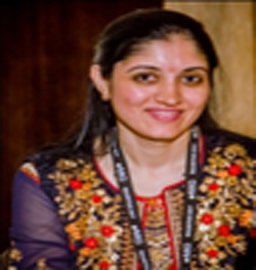
Dr Upasana Singh
Discipline of Information Systems and Technology University of KwaZulu Natal, Westville Campus, Durban South Africa
Dr Upasana Singh is a lecturer in the Discipline of Information Systems and Technology at the University of KwaZulu Natal, Westville Campus, in Durban South Africa. She lectures on a wide-range of IT-related subjects. In 2014, she received 2 research awards, one from the NRF and the other from UKZN, CLMS Teaching and Learning Unit. She served as panel reviewer for the NRFs Joint Collaboration applications in 2015 and 2016. Joint academic collaboration is one of her fortes having secured 3 MoUs with international universities. This has provided her with the platform to share her knowledge as invited guest speaker to local and international conferences in South Africa, India and Mauritius since 2015. She expanded this collaboration interest by volunteering as local co-ordinator for the 3rd IEEE ICACCE conference, held in Durban in 2016; e-MIG 2017 and 2019 Conferences held in Mauritius; a committee member for the AAE Summer School in France 2017; and the local organizing chair for the icABCD conference 2018& 2019. In 2017 she was selected to join the “Joint Expertise Programme” at Chemnitz Technical University in Germany; and selected to represent UKZN at MoodleMoot Australia in Sydney. She also has a keen interest in joint curriculum development with International Higher Education Institutions. In 2019 she graduated with a Fellowship in “Teaching Advancement in Universities” (TAU), from the CHE. Although still an emerging academic, she has delivered over 8 keynote speeches at International Conferences as well as served as guest lecturer at over 6 International HEIs. Her primary area of research is Digital Teaching and Learning in Higher Education but has recently expanded this to include AI, the 4IR and Big Data. She is currently one of the Principle Investigators in 2 interdisciplinary research projects – the first is linked to UKZN’s flagship projects, on Big Data, specifically focusing on Water Desalination and the second is an International Project on CyberBullying, with researchers from the University of Huddersfield. She has a strong passion for female empowerment and has successfully organized 2 Women in Engineering events, to empower over 500 female school learners to adopt STEM careers.
Keynote Topic:
The internet has found its way into the day-to-day lives of most of us. Ubiquitous computing has created sophisticated, streamlined and faster connections across a range of technological devices. It is common for each individual today to own more than one technological device, amongst these, the mobile phone being the most important. Mobile smart phones users include children as young as five years old. Whilst this allows them to interact with educational applications and the wealth of information available on-line, it can also put them in grave danger.
The number of episodes involving children and adolescents being at risk because of unsafe on-line behavior has increased over the recent years. “Predators can prey on the vulnerable, by pretending to be a peer and convincing them, by charm or threats, to compromise their safety”. Some of these incidents have such grave results which is forcing governments internationally to implement initiatives to combat this threat. Special working groups and police task forces have been put in place to respond to “both the growing number, and impact of these incidents on children, young people, families and communities”. This talk briefly outlines how Natural Language Processing (NLP) can be used to monitor on-line conversations, as well as identify different levels of threats.